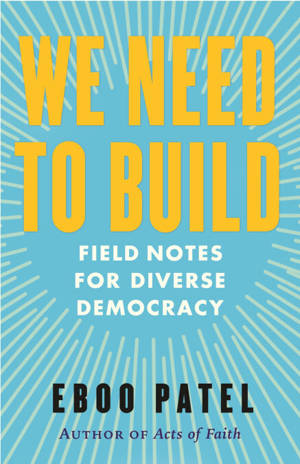
- Afhalen na 1 uur in een winkel met voorraad
- Gratis thuislevering in België vanaf € 30
- Ruim aanbod met 7 miljoen producten
- Afhalen na 1 uur in een winkel met voorraad
- Gratis thuislevering in België vanaf € 30
- Ruim aanbod met 7 miljoen producten
Zoeken
€ 18,68
+ 18 punten
Uitvoering
Omschrijving
“You don’t create societies by burning things down, You create societies by building things.”
From the former faith adviser to President Obama comes a fresh manifesto for those who seek to promote positive change and build a more diverse and just democracy
The goal of social change work is not a more ferocious revolution; it is a more beautiful social order. It is harder to organize a fair trial than it is to fire up a crowd, more challenging to build a good school than it is to tell others they are doing education all wrong. But every decent society requires fair trials and good schools, and that’s just the beginning of the list of institutions and structures that need to be efficiently created and effectively run in large-scale diverse democracy.
We Need to Build is a call to create those institutions and a guide for how to run them well.
In his youth, Eboo Patel was inspired by love-based activists like John Lewis, Martin Luther King Jr., Badshah Khan, Mahatma Gandhi, Mother Teresa, Dorothy Day, Abraham Joshua Heschel, and Thich Nhat Hanh. Their example, and a timely challenge to build the change he wanted to see, led to a life engaged in the particulars of building, nourishing, and sustaining an institution that seeks to promote positive social change—Interfaith America. Now, drawing on his twenty years of experience, Patel tells the stories of what he’s learned and how, in the process, he came to construct as much as critique and collaborate more than oppose.
His challenge to us is clear: those of us committed to refounding America as a just and inclusive democracy need to defeat the things we don’t like by building the things we do.
From the former faith adviser to President Obama comes a fresh manifesto for those who seek to promote positive change and build a more diverse and just democracy
The goal of social change work is not a more ferocious revolution; it is a more beautiful social order. It is harder to organize a fair trial than it is to fire up a crowd, more challenging to build a good school than it is to tell others they are doing education all wrong. But every decent society requires fair trials and good schools, and that’s just the beginning of the list of institutions and structures that need to be efficiently created and effectively run in large-scale diverse democracy.
We Need to Build is a call to create those institutions and a guide for how to run them well.
In his youth, Eboo Patel was inspired by love-based activists like John Lewis, Martin Luther King Jr., Badshah Khan, Mahatma Gandhi, Mother Teresa, Dorothy Day, Abraham Joshua Heschel, and Thich Nhat Hanh. Their example, and a timely challenge to build the change he wanted to see, led to a life engaged in the particulars of building, nourishing, and sustaining an institution that seeks to promote positive social change—Interfaith America. Now, drawing on his twenty years of experience, Patel tells the stories of what he’s learned and how, in the process, he came to construct as much as critique and collaborate more than oppose.
His challenge to us is clear: those of us committed to refounding America as a just and inclusive democracy need to defeat the things we don’t like by building the things we do.
Specificaties
Betrokkenen
- Auteur(s):
- Uitgeverij:
Inhoud
- Aantal bladzijden:
- 224
- Taal:
- Engels
Eigenschappen
- Productcode (EAN):
- 9780807024072
- Verschijningsdatum:
- 9/05/2022
- Uitvoering:
- E-book
- Beveiligd met:
- Adobe DRM
- Formaat:
- ePub

Alleen bij Standaard Boekhandel
+ 18 punten op je klantenkaart van Standaard Boekhandel
Beoordelingen
We publiceren alleen reviews die voldoen aan de voorwaarden voor reviews. Bekijk onze voorwaarden voor reviews.








